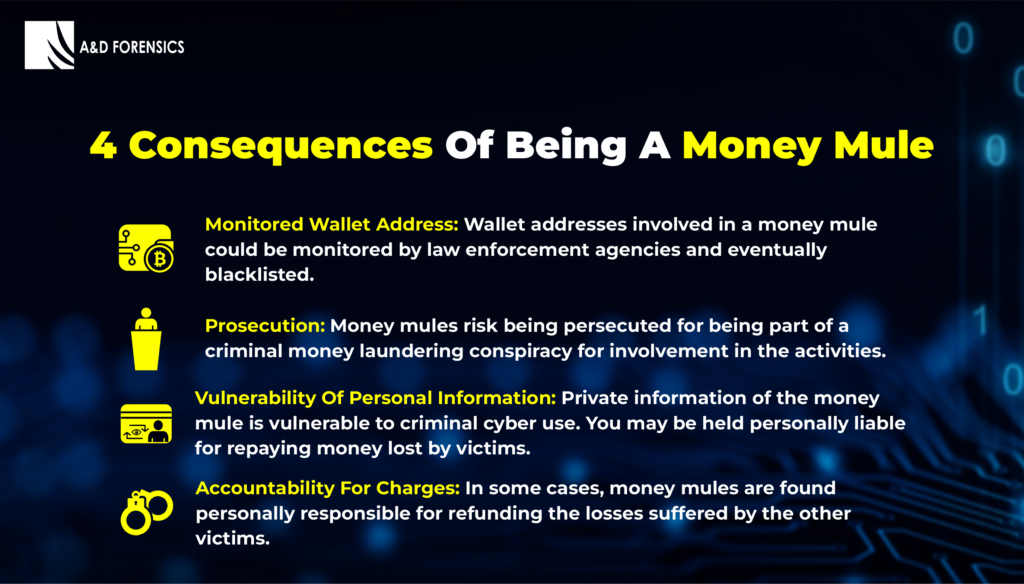Money muling is a menace in any given society and you can face various consequences if you become a Money Mule . It aids cybercrime and helps perpetrators to carry out organized criminal activities with minimized traces.
Money Muling is recognized as the most commonly used money laundering scheme. It adds complicated layers and obstructs legal actions against criminals. However, more emphasis needs to be made on the fact that it is a crime punishable by law.
On answerthepublic.com, only a few questions have been asked about money muling. In Abuja, Nigeria, here is the response from a respondent, “I have lost count of the number of times I get asked if I had a certain account with specific banks. To be honest, I usually feel bad for not having such an account because commissions on these kinds of deals are huge. Meanwhile, the account holders are usually not required to do much for the employers”. Of course, this statement suggests that money mules consider these activities to be business deals. And they get paid a commission for making the deals.
Regretably, Ignorance is not an excuse before a court of law. Acts carried out by money mules lead to criminal sanctions. Hence, follow carefully as we expound on the topic “Money muling”.

Money Muling and Its Impact on Targeted Mules
Money laundering schemes, including money muling, have been flagged as threats in the financial world today, especially the cryptocurrency market being a primary target.
The Blockchain and Cryptocurrency industry makes it easy to transfer money pseudonymously. In addition, Obfuscation techniques and platforms like Tornado cash are ways people try to hide their identity behind fund transfers. More criminals exploit these platforms in order not to be traced. Hence, criminals with illegal money always search for ways to hide so as not to be caught.
Money muling, however, makes it much more tasking to uncover financial crimes. Mules are used to distract funds as they travel and are being traced. Money Mules help criminals move huge funds swiftly across a network of accounts, often in different countries because of their unwitting behaviours.
Research by Barclay reveals 52% of its students age 21 have once been recruited to transfer money as of 29th September 2020. This research shows that most mules are below the age of 21. Meanwhile, these students were never aware they had been used as money mules. Also, other primary mule targets are migrants, unemployed persons and job seekers.
What Are Money Mules?
A Money mule is a person who commits the crime of money muling. They can also be seen as persons who transfer illegally acquired money on behalf of another. Hence, money muling is the act of helping someone transfer illegal money.
Money mules, unknowingly or knowingly, have been recruited as money laundering intermediaries for criminals and criminal organisations. Sometimes, money mules who assist criminal organisations in moving illegal funds commit such crimes to receive a commission. In some cases, they could be in a romantic relationship with the individual seeking help.
On the other hand, some money mules may need to be made aware that the money they are transferring is illegal. In any case, they have played a significant role in fraud and money laundering, for which they can be prosecuted, fined or imprisoned for committing an illicit act.
Who Recruits Mules in Money Muling Schemes?
Mule herders are people who recruit money mules. They search social media platforms to obtain information about potential mules.
Once a mule herder gets the required details about potential money mules, they trick them into receiving stolen money in their bank account or cryptocurrency wallet.
How Are Mules Recruited in Money Muling Schemes?
Money mules are usually recruited unsuspectingly. The money transfer agent announces fake job adverts on online job forums, emails and social media platforms like Facebook, Instagram, TikTok, LinkedIn, and others.
Other recruitment strategies that criminals use, are direct messages sent to the individual through instant messaging apps like WhatsApp, Telegram, etc. and directly in person, ie. on the street.
6 Warning Signs To Note About Money Mules Being involved in Money Muling Schemes.
The victims of money mules are most often unaware they are being used. Check out the warning signs to avoid falling prey.
- Money mule adverts use a fake copy of the company’s website. Victims are made to believe that the websites are genuine.
- The sender usually communicates via a free web-based email service (Gmail, Yahoo mail, Hot mail or Outlook). The main content is most often poorly written.
- The recruiter usually insists on doing all communication and transactions online. The sender will never allow voice or video chat.
- The job does not require educational qualifications and work experience, just a trading account, a crypto wallet or bank account details.
- Money mule victims are also reached via social media (WhatsApp, Telegram, Instant messaging). The offer promises easy money for little effort.
- As an employee, you are asked to receive funds in your cryptocurrency wallet or bank account and then “process” or “transfer” funds via wire transfer, mail, or money service businesses (such as Western Union or MoneyGram)
Consequences of Being a Mule in Money Muling Schemes
There are severe consequences for being a money mule. As stated earlier, ignorance is not an excuse, and Money muling is a criminal offence. To aid the movement of fraudulent money through your cryptocurrency wallet or bank account is a crime. Do Not Be a Mule!

Let’s look at the consequences for being a money mule:
- Monitored wallet address: Wallet addresses involved in a mule could be monitored by law enforcement agencies and eventually blacklisted.
- Prosecution: Money mules risk being persecuted for being part of a criminal money laundering conspiracy for involvement in the activities.
- Vulnerability of personal information: Private information of the money mule is vulnerable to criminal cyber use. You may be held personally liable for repaying money lost by victims.
- Accountability for charges: In some cases, money mules are found personally responsible for refunding the losses suffered by the other victims.
How Money Launderers Take Advantage of Mules in Money Muling Schemes
Criminals recruit money mules as a means to launder money. These criminals carry out the laundering process to avoid customer due diligence (CDD), thereby concealing their identities and source of funds.
The laundering process may proceed in the following way:
- A money mule opens an account. The money mule is asked to open an account with a bank or visual assets provider (VASP).
- Funds are deposited in the mule’s wallet/account from a criminal source.
- The criminals instruct the mule on how and where they should move the funds.
- Mules transfer the illegal funds to a third-party account or withdraw them as cash.
- Money transferred from a mule account may then be converted into a virtual currency, such as Bitcoin, to prevent authorities from tracing its origin.
How Can A&D Forensics Help?
Money muling poses a critical threat in the cryptocurrency industry. It represents a compliance issue and paves the way for money laundering and terrorist financing.
At A&D Forensics, we are committed to making transacting in the blockchain and cryptocurrency space safe. We train Cryptocurrency Compliance Specialists and certify Cryptocurrency Investigators through our partnership with Blockchain Intelligence Group. Our solutions offer several other benefits to VASPs and Cryptocurrency Users.
Follow our blog and subscribe to our newsletters to stay updated on blockchain and cryptocurrency-related issues and events as they unfold.
Conclusion
As the world evolves, blockchain and other financial agencies implement more sophisticated security measures to tackle emerging challenges.
Always be vigilant. Protect yourself and your organization. Do not share personal account details and wallet private key. Never agree to help people receive money or transfer funds if you doubt the legality of its roots.
Contributors: Emmanuel Bassey; Loveth Odije; Chioma Agbo






